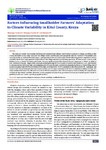Factors Influencing Smallholder Farmers’ Adaptation to Climate Variability in Kitui County, Kenya

View/
Date
2018-02Author
Mutunga, Evelyn J
Ndungu, Charles K.
Muendo, Patricia
Metadata
Show full item recordAbstract
The study was carried out to examine the factors and constraints that influence small farmers’ adaptation to climate variability in Kitui County. Descriptive survey design was used. Two villages, Kaveta and Mikuyuni, were purposively selected. A total of 177 households were randomly selected to constitute the study sample. Logit regression model was used to analyze factors influencing farmers’ adaptation to climate variability. Results from Logit regression analysis showed that village, education level, farming experience, off- farm income, access to credit facilities, access to climate information and weather forecasts significantly (p<0.05) influenced farmers’ adaptation to climate variability in both Kaveta and Mikuyuni villages. While inadequate technological capacity (78.2%), lack of access to credit facilities (72.2%), lack of access to extension services (68%) and high cost of adaptation (66.8%) were the major constraints to adaptation by farmers in Kaveta Village, lack of access to irrigation water (89.6%), lack of labor (86%), high cost of adaptation (81.4%), unreliable weather forecasts (81.4%), inadequate land resources (76.4%) and inadequate financial resources (74%) were the major constraints to the farmers’ adaptation in Mikuyuni Village. The study established that farmers in different locations faced different constraints in their efforts to adapt to climate variability. The study therefore recommends that climate variability adaptation policies, programs and projects by government and non-governmental agencies should be guided by local farmers’ needs in specific geographic locations.
